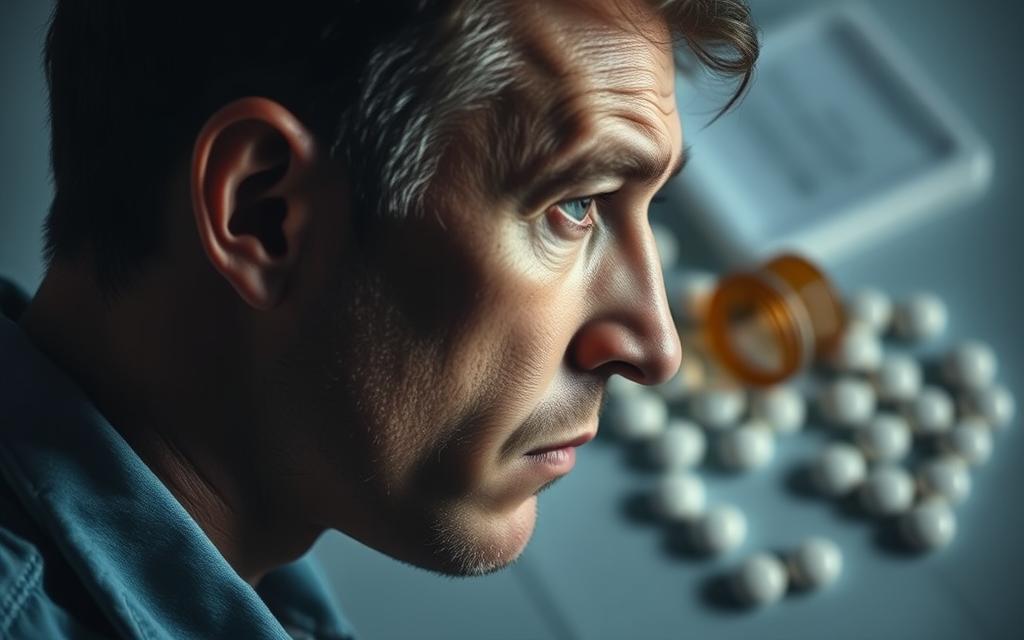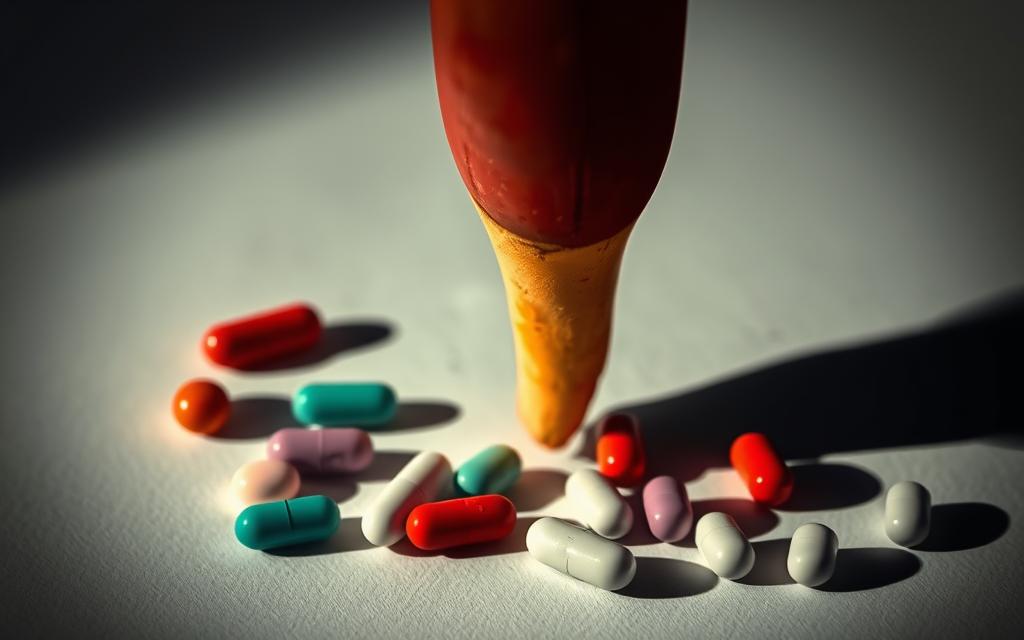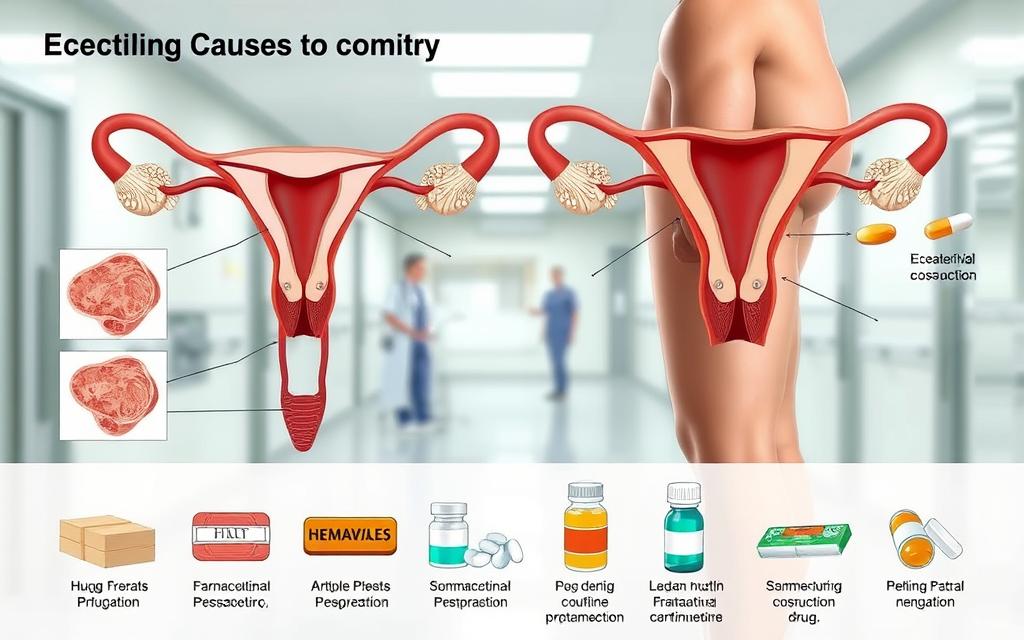Drugs That Cause Erectile Dysfunction: Causes, Risks, and Alternatives
Erectile dysfunction (ED) is a condition that affects millions of men worldwide, impacting their quality of life and relationships. While there are various factors that contribute to ED, certain medications can play a significant role.
Understanding the link between medications and ED is crucial for managing the condition effectively. Some drugs, whether prescribed or over-the-counter, can have side effects that impact sexual health.
It’s essential to recognize that ED is not just a matter of age or lifestyle; it can be a side effect of certain medications. By exploring the causes and risks associated with ED, we can better understand the alternatives available.
Understanding Erectile Dysfunction and Medication Side Effects
Understanding how certain medications impact sexual function is crucial for addressing erectile dysfunction effectively. Erectile dysfunction (ED) is a condition that can result from a variety of factors, including medication side effects. Medications, while designed to treat various health conditions, can sometimes have unintended consequences on sexual health.
How Medications Affect Sexual Function
Many medications can affect sexual function, leading to erectile dysfunction. Common culprits include certain antidepressants, blood pressure medications, and hormonal treatments. These drugs can interfere with the physiological processes involved in achieving an erection, such as blood flow and nerve function. For instance, some medications can cause blood vessels to constrict, reducing blood flow to the penis.
Some key factors to consider include:
- The type of medication and its dosage
- The presence of underlying health conditions
- The individual’s overall health and lifestyle
The Physiology of Erections and Drug Interference
The physiology of erections involves a complex interplay of neurological, vascular, and hormonal processes. Neurological signals initiate the process, leading to the release of chemicals that cause blood vessels to relax and fill with blood. Certain medications can disrupt this delicate process. For example, some drugs can affect the levels of hormones such as testosterone, which plays a crucial role in sexual function.
Understanding the physiological basis of erections and how drugs can interfere with this process is essential for identifying the causes of erectile dysfunction and exploring alternative treatments, such as sexual dysfunction treatment options.
Does Finasteride Spray Cause Erectile Dysfunction?
As a popular remedy for hair loss, finasteride spray’s association with erectile dysfunction is a topic of increasing interest. Finasteride is a medication primarily used to treat male pattern baldness and benign prostatic hyperplasia. Its effectiveness in promoting hair growth has made it a widely used treatment.
What is Finasteride and How Does It Work?
Finasteride works by inhibiting the conversion of testosterone to dihydrotestosterone (DHT), a hormone involved in hair loss. By reducing DHT levels, finasteride helps to slow down hair loss and stimulate hair regrowth. This mechanism is key to understanding its potential effects on sexual health.
Clinical Evidence Linking Finasteride to ED
Some studies have investigated the link between finasteride and erectile dysfunction. Clinical trials and patient reports have provided mixed results, with some indicating a potential link while others find no significant association. A comprehensive review of these studies is necessary to understand the risks.

Topical vs. Oral Finasteride: Differences in Side Effects
The mode of administration (topical vs. oral) may influence the risk of side effects, including erectile dysfunction. Topical finasteride is believed to have fewer systemic side effects compared to oral finasteride because it is applied directly to the scalp, potentially reducing the amount that enters the bloodstream.
Risk Factors That May Increase Susceptibility
Certain individuals may be more susceptible to the sexual side effects of finasteride. Factors such as age, health conditions, and concurrent medications can play a role. Understanding these risk factors is crucial for men considering finasteride treatment.
| Risk Factor | Description | Potential Impact |
|---|---|---|
| Age | Older men may be more susceptible to side effects. | Increased risk of ED |
| Health Conditions | Pre-existing health issues can affect how finasteride is tolerated. | Higher likelihood of sexual side effects |
| Concurrent Medications | Other medications may interact with finasteride, increasing the risk of ED. | Potential for adverse interactions |
Common Prescription Medications That May Cause ED
Certain prescription medications can interfere with erectile function, leading to difficulties in achieving or maintaining an erection. This issue is more common than one might expect, and understanding the medications involved is crucial for managing erectile dysfunction (ED) effectively.
Blood Pressure Medications and ED
Blood pressure medications, particularly beta-blockers and diuretics, have been associated with erectile dysfunction. These medications can affect blood flow, potentially impairing erectile function. For instance, beta-blockers can reduce blood flow to the penis, making it difficult to achieve an erection. It’s essential for men taking these medications to discuss their sexual health with their healthcare provider.
Antidepressants and Sexual Dysfunction
Antidepressants, especially selective serotonin reuptake inhibitors (SSRIs), are known to cause sexual side effects, including erectile dysfunction. The mechanism is not entirely clear, but it’s believed that SSRIs can affect serotonin levels, which play a role in sexual function. Men experiencing ED while on antidepressants should consult their doctor about potential alternatives or adjustments to their medication regimen.
Hormonal Treatments and Their Impact
Hormonal treatments, such as those used for prostate cancer or hormonal imbalances, can also impact erectile function. For example, therapies that reduce testosterone levels can lead to ED. Understanding the potential side effects of hormonal treatments can help men prepare and discuss potential alternatives with their healthcare provider.
Other Prescription Drugs That Affect Sexual Health
Besides blood pressure medications, antidepressants, and hormonal treatments, other prescription drugs can affect sexual health. For instance, certain antihistamines and antipsychotics have been linked to sexual dysfunction. It’s crucial for individuals taking any medication to be aware of the potential side effects on their sexual health and to discuss any concerns with their healthcare provider. For more information on how specific medications, like finasteride, impact erectile dysfunction, visit Colorado Urologists.
Over-the-Counter and Recreational Substances That Contribute to ED
Beyond prescription medications, various over-the-counter (OTC) and recreational substances can significantly impact erectile function. While often overlooked, these substances can contribute to erectile dysfunction risks and complicate sexual dysfunction treatment. It’s essential to understand how these factors interplay with other health conditions and medications, such as finasteride spray side effects, to address ED comprehensively.

Alcohol and Its Effects on Sexual Performance
Alcohol consumption is a well-known risk factor for erectile dysfunction. Chronic alcohol use can damage the nerves and blood vessels crucial for achieving an erection. Moreover, acute alcohol consumption can impair sexual performance by reducing libido and causing erectile difficulties.
Nicotine and Erectile Function
Nicotine, found in tobacco products, is another substance that can adversely affect erectile function. It damages blood vessels, reduces blood flow to the penis, and can lead to erectile dysfunction. Quitting smoking is often recommended as part of a comprehensive approach to addressing ED.
Recreational Drugs and Their Impact on Sexual Health
Recreational drugs, including marijuana, cocaine, and heroin, have been linked to sexual dysfunction. These substances can affect hormone levels, damage blood vessels, and impair nerve function, all of which are critical for healthy sexual function.
Supplements and OTC Medications to Be Cautious About
Certain supplements and OTC medications can also contribute to erectile dysfunction. For example, some cold medications and certain herbal supplements can have unintended effects on sexual health. It’s crucial to consult with a healthcare provider before starting any new supplement or medication.
In conclusion, a variety of substances beyond prescription medications can contribute to erectile dysfunction. Being aware of these risks is the first step towards mitigating them and seeking appropriate sexual dysfunction treatment.
Alternatives and Solutions for Medication-Induced ED
There are multiple approaches to addressing erectile dysfunction that arises from medication use. For many individuals, the key to managing medication-induced ED lies in exploring alternative treatments or making lifestyle adjustments.
Medication Adjustments and Alternatives
In some cases, adjusting the dosage or switching to a different medication can alleviate ED symptoms. It’s essential to consult with a healthcare provider to determine the best course of action. For instance, certain treatments for erectile dysfunction can be explored when common medications like Viagra are ineffective.
Lifestyle Modifications That Can Help
Making healthy lifestyle choices can significantly impact erectile function. Regular exercise, a balanced diet, and stress management can all contribute to improved sexual health. Quitting smoking and reducing alcohol consumption are also crucial steps.
Medical Treatments for ED Caused by Necessary Medications
When medication-induced ED is a concern, medical treatments can offer relief. Options may include oral medications, vacuum erection devices, or other therapies designed to support erectile function.
Natural Approaches to Supporting Sexual Health
In addition to medical treatments, natural approaches can complement a treatment plan. Certain supplements and dietary changes may help support sexual health, though it’s crucial to consult with a healthcare provider before adding any new supplements.
| Approach | Description | Potential Benefits |
|---|---|---|
| Medication Adjustments | Changing or adjusting current medications | Reduced ED symptoms, improved sexual function |
| Lifestyle Modifications | Adopting healthier habits like exercise and a balanced diet | Improved overall health, enhanced erectile function |
| Medical Treatments | Using therapies like oral medications or devices | Direct treatment of ED, improved sexual health |
| Natural Approaches | Incorporating supplements and dietary changes | Supporting sexual health, potential improvement in ED |
Conclusion: Balancing Treatment Benefits and Sexual Health
Balancing the benefits of medication with sexual health is crucial for overall well-being. As discussed, various medications, including finasteride, can impact erectile function. Understanding the causes of erectile dysfunction and exploring available treatment options can help mitigate potential side effects.
Research suggests that finasteride and sexual health are closely linked, with some studies indicating a potential risk of erectile dysfunction. However, the incidence of erectile dysfunction in men using minoxidil for hair loss is relatively low, at 2.5% in one study. Similarly, reports of erectile dysfunction associated with minoxidil use are rare, at 0.01% of total reports in the FAERS Database.
By understanding the relationship between finasteride and sexual health, individuals can make informed decisions about their treatment. Exploring alternative treatments for erectile dysfunction and adopting lifestyle modifications can also help alleviate symptoms. Ultimately, finding a balance between treatment benefits and sexual health is essential for maintaining overall health and well-being.
